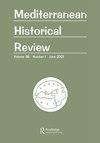Captives or crooks? Pirates, impostors, and Jewish communities in the eighteenth-century Ottoman Empire
IF 0.2
2区 历史学
Q1 HISTORY
引用次数: 1
Abstract
In the present article, based on Ottoman and Hebrew documents, we focus on people who made up fictitious stories of captivity in order to gain a living, as well as on authorities or local Jewish communities that detected and coped with those frauds in the eighteenth-century Ottoman Empire. In detecting acts of fraud, a novel method adopted by Jewish communities during the period under study was printed letters that were not available to all segments of society. Considering the vigilance of Jewish communities to root out the ploys used by their co-religionists to acquire money through deceitful means, we suggest that those communities formulated some regulations in order to validate authenticity and differentiate between the true and the fake. We argue that an efficient web of networks among early modern Jewish communities in the Mediterranean and the use of the printing press played a crucial role in certifying the truthfulness of a document or a person.俘虏还是骗子?18世纪奥斯曼帝国的海盗、冒名顶替者和犹太社区
在本文中,基于奥斯曼和希伯来文献,我们将重点放在那些为了谋生而编造虚构的囚禁故事的人,以及在18世纪奥斯曼帝国发现并应对这些欺诈行为的当局或当地犹太社区。在调查欺诈行为时,犹太社区在研究期间采用的一种新方法是印刷社会各阶层无法获得的信件。考虑到犹太社区对根除同教者通过欺骗手段获取金钱的手段的警惕,我们建议这些社区制定一些规定,以验证真实性并区分真假。我们认为,早期现代地中海犹太人社区之间的有效网络和印刷机的使用在证明文件或个人的真实性方面发挥了至关重要的作用。
本文章由计算机程序翻译,如有差异,请以英文原文为准。
求助全文
约1分钟内获得全文
求助全文

 求助内容:
求助内容: 应助结果提醒方式:
应助结果提醒方式:


